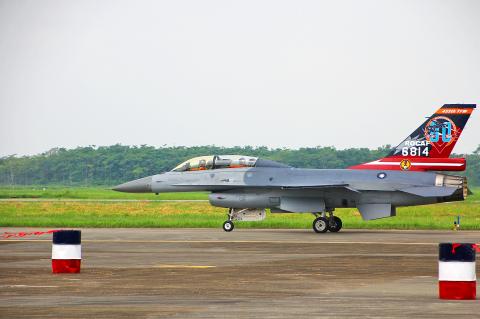The Ministry of National Defense is to increase the budget to upgrade the air force’s F-16 warplane fleet from NT$129.6 billion to NT$140.2 billion (US$4.21 billion to US$4.56 billion), a high-ranking defense official said yesterday.
Most of the budget increase aims to boost the number and types of air-to-air missiles the aircraft can carry, said the official, who declined to be named.
Better missiles are necessary to maintain parity between the upgraded F-16s and the Chinese People’s Liberation Army Air Force’s tactical fighters, the official said.

Photo: Lin Yi-chang, Taipei Times
Details of the missile portion of the budget would be disclosed to lawmakers on the Foreign Affairs and National Defense Committee when the Legislative Yuan reviews the national defense budget for fiscal 2019, the official said.
After the fatal crash of an F-16 piloted by major Wu Yen-ting (吳彥霆) during the annual Han Kuang military exercises in June, the military has decided to install the latest version of the automated ground collision avoidance system, which would also be covered by the additional funding, they said.
The system, which has been installed in the US Air Force’s F-16 fleet, enables the aircraft to pull up before crashing into the ground independently of pilot input, which is advantageous in instances where a pilot has been incapacitated or otherwise fails to take action to avoid controlled flight into terrain, they added.
The Republic of China Air Force’s standard-issue equipment for that purpose is the equivalent of the enhanced ground proximity warning system utilized by civilian airliners, the official said.
The proximity warning system is designed to emit an audio warning to the pilot when an aircraft is dangerously close to the ground, but it is not capable of taking action independently of the pilot, they said.
The US government has agreed to supply the armaments and equipment identified in the budget, while an earlier scheme for F-16V performance improvement packages — which is to be completed by 2023 — is to be followed as planned, the official said.

A Ministry of Foreign Affairs official yesterday said that a delegation that visited China for an APEC meeting did not receive any kind of treatment that downgraded Taiwan’s sovereignty. Department of International Organizations Director-General Jonathan Sun (孫儉元) said that he and a group of ministry officials visited Shenzhen, China, to attend the APEC Informal Senior Officials’ Meeting last month. The trip went “smoothly and safely” for all Taiwanese delegates, as the Chinese side arranged the trip in accordance with long-standing practices, Sun said at the ministry’s weekly briefing. The Taiwanese group did not encounter any political suppression, he said. Sun made the remarks when

The Taiwanese passport ranked 33rd in a global listing of passports by convenience this month, rising three places from last month’s ranking, but matching its position in January last year. The Henley Passport Index, an international ranking of passports by the number of designations its holder can travel to without a visa, showed that the Taiwan passport enables holders to travel to 139 countries and territories without a visa. Singapore’s passport was ranked the most powerful with visa-free access to 192 destinations out of 227, according to the index published on Tuesday by UK-based migration investment consultancy firm Henley and Partners. Japan’s and

BROAD AGREEMENT: The two are nearing a trade deal to reduce Taiwan’s tariff to 15% and a commitment for TSMC to build five more fabs, a ‘New York Times’ report said Taiwan and the US have reached a broad consensus on a trade deal, the Executive Yuan’s Office of Trade Negotiations said yesterday, after a report said that Washington is set to reduce Taiwan’s tariff rate to 15 percent. The New York Times on Monday reported that the two nations are nearing a trade deal to reduce Taiwan’s tariff rate to 15 percent and commit Taiwan Semiconductor Manufacturing Co (TSMC, 台積電) to building at least five more facilities in the US. “The agreement, which has been under negotiation for months, is being legally scrubbed and could be announced this month,” the paper said,

MIXED SOURCING: While Taiwan is expanding domestic production, it also sources munitions overseas, as some, like M855 rounds, are cheaper than locally made ones Taiwan and the US plan to jointly produce 155mm artillery shells, as the munition is in high demand due to the Ukraine-Russia war and should be useful in Taiwan’s self-defense, Armaments Bureau Director-General Lieutenant General Lin Wen-hsiang (林文祥) told lawmakers in Taipei yesterday. Lin was responding to questions about Taiwan’s partnership with allies in producing munitions at a meeting of the legislature’s Foreign Affairs and National Defense Committee. Given the intense demand for 155mm artillery shells in Ukraine’s defense against the Russian invasion, and in light of Taiwan’s own defensive needs, Taipei and Washington plan to jointly produce 155mm shells, said Lin,